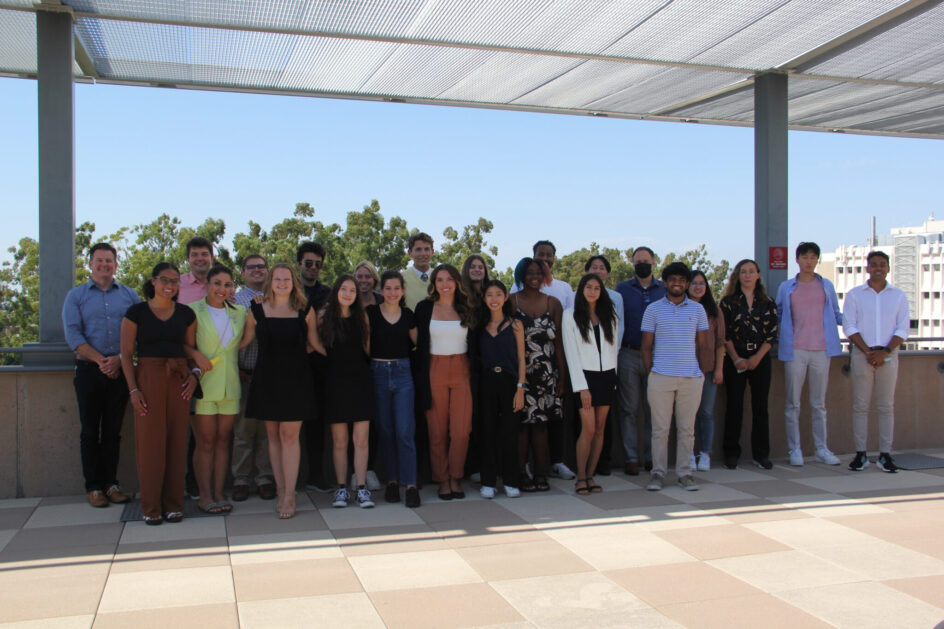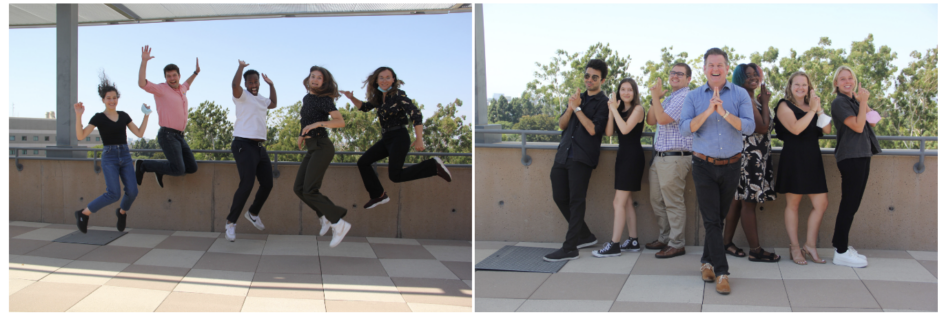Undergraduates Conduct Biostatistics Research at New Summer Institute at UCI
From July 11 through August 19, 2022, twenty-three students from around the U.S. came to UCI for the newly launched Irvine Summer Institute in Biostatistics and Undergraduate Data Science (ISI-BUDS). The institute is part of the Summer Institute in Biostatistics program offered through the National Heart, Lung, and Blood Institute (NHLBI) and the National Institute of Allergy and Infectious Diseases (NIAID). This year, UCI became only the 10th university in the nation to host this free, six-week summer training course aimed at addressing the growing need for biostatisticians and data scientists.
Offered through the Department of Statistics in the Donald Bren School of Information and Computer Sciences (ICS), the ISI-BUDS program provides not only training in the fundamentals of biostatistics, data science and computing, but also experience in conducting cutting-edge biomedical research. “The main goal is to excite students about careers and graduate school in biostatistics,” says Statistics Professor Vladimir Minin, who co-directs the program with ICS colleagues Dan Gillen, Babak Shahbaba and Mine Dogucu. “Careers in biostatistics are peculiar in the sense that a lot of them require a graduate degree, so there’s a need for more training in this area,” explains Minin. “However, biostatistics is rarely taught at the undergraduate level, so many undergraduate students do not know about career opportunities in this area.”
Sarah Schlund, a senior at UC Santa Barbara double-majoring in statistics and data science and in geography, agrees. “I had been searching for an opportunity to gain experience in biostatistics prior to committing to a five-year doctorate program in the field. However, such opportunities are few and far between,” she says. “ISI-BUDS offers the rare opportunity to gain biostatistics experience as an undergraduate and learn from the very impressive faculty at UCI, who have immense biostatistics knowledge and experience, both in industry and academic research.”

An Impressive Inaugural Cohort
The inaugural cohort of students, selected from more than 150 applications, came from a wide variety of schools, including the University of Connecticut, Emory University, Montana State University, the University of Arizona, University of Michigan, University of Vermont and University of Washington. There was also a regional presence, with students from UCI, UC Riverside, UC Santa Barbara and UCLA. The highly competitive program includes up to $500 in travel expenses, free housing and a meal plan (or a $2,500 stipend), as well as $600 for incidental expenses.
The cohort was also a diverse group of students, with almost 40% coming from groups that are underrepresented in the quantitative sciences. “We were able to recruit a significant number of students from historically excluded backgrounds, with the hope of increasing diversity in the field of biostatistics,” says Minin. “That was a very important goal, because many are first-generation college students who typically lack information about graduate school and about the many career options open to them.”
The program included career preparedness activities, including a workshop on the grad school application process and a Q&A with Ph.D. students, and outlined classes that students should take to have a more competitive application. “Making this information available to everyone levels the playing field a little bit,” explains Minin.
People from pharmaceutical and biotech companies, including UCI data science graduate Jessica George, came to talk with students about careers in the biotech industry. In addition, communications coach Bri McWhorter gave a two-hour workshop on how to present scientific information, helping prepare students for their research presentations. On the final day of the program, Karren Messer, who is a professor and chief of the Division of Biostatistics at the Herbert Wertheim School of Public Health at UC San Diego, gave a talk and offered students valuable feedback on their presentations.
“It was a very impressive group of students,” says Gillen, chair of the UCI Department of Statistics. “They came in and within six weeks, they did three weeks of courses, both on technical [and] soft skills, and then they jumped right into three weeks of real research, pounding out an amazing amount of work and giving wonderful presentations at the end of it.”
Real-World Research a Smashing Success
Students attending the program started with lectures and labs conducted by six different instructors and a statistics Ph.D. student teaching assistant, learning how to design and analyze clinical trials; model infectious disease dynamics; and analyze big data in genomics, transcriptomics and imaging.
“The students came from various backgrounds, so we spent the first three weeks making sure they were all on the same page in terms of their technical knowledge,” says Minin. “We devoted this time to checking off all the boxes of what they needed to know for their research projects.”
Students then worked under the supervision of research mentors. In addition to statistics professors Gillen, Minin and Shahbaba, the following also served as mentors:
- Louis Ehwerhemuepha, manager of computational research, CHOC Research Institute;
- Lauren Gyllenhammer, assistant professor of pediatrics, UCI;
- Daniel Parker, assistant professor of population health and disease prevention, UCI;
- Elizabeth Read, assistant professor of chemical and biomolecular engineering, UCI; and
- Pathik Wadhwa, professor of psychiatry & human behavior, UCI.
“The real heart of the program was the research projects, and that was only possible because of the dedication of the biomedical scientists whom we asked to participate,” says Minin. “It was a smashing success because of their engagement with the students.” In addition, four statistics Ph.D. students provided invaluable support to the teams during the project phase of the institute.
The research covered the following topics:
- analyzing the impact of maternal stress volatility during pregnancy on child health outcomes,
- predicting maternal stress during pregnancy,
- understanding movement patterns of farmers and forest workers from the Thailand-Myanmar border,
- conducting a spatio-temporal analysis of melioidosis cases in Lao People’s Democratic Republic,
- uncovering gene-gene interaction motifs from single cell transcriptomic data, and
- assessing associations between congenital conditions and COVID-19 severity in children.
“I was motivated to apply to this program because I was thrilled to get my hands on some real-world biomedical data, do collaborative research, and learn from world class experts in statistics by means of the UCI Department of Statistics faculty,” says Dante Ramirez, an undergraduate majoring in statistics and minoring in bioethics at the University of Washington. “What I liked best about the program was the opportunity to collaborate with like-minded statisticians in a clinical research setting. Working with a cohort of statisticians and data scientists with relatively homogeneous skills in this setting and being guided by statistical mentors is such a special opportunity in learning my own strengths and weaknesses, how to effectively communicate and work with others, and how to do contemporary clinical and quantitative research.”
Although Ramirez had originally intended to go straight into industry after graduating, he has since changed his plans. “The ISI-BUDS program [convinced] me to apply to a biostatistics or public health graduate school program, as this would make my goal of transitioning into a public health regulatory position much more attainable.”

Exploring So Cal
Both Ramirez and Schlund were impressed by the research experience gained, as well as by the ability to enjoy some downtime and explore Southern California. “I was pleasantly surprised with the culture of the department and how plentiful the weekend activities were,” says Ramirez, “as they were very conducive of bonding between my cohort and meeting various graduate students.”
Schlund agreed. “The professors also made large efforts to get to know us personally outside of dedicated lecture and research time. [They] planned and attended weekend events that included kayaking, whale watching, hiking, etc.,” she says. “Every professor in the program has been exceptionally personable, kind and genuine to every student in the program.”
Summer 2023
ISI-BUDS has secured funding for a minimum of five years, so planning for summer 2023 is already underway. Registration will open in March 2023, and you can visit the application page for more information.
“We want to make sure that we’re feeding a diverse pipeline for the STEM fields in general, but also for biostatistics and statistics,” says Gillen. “So we’re going to continue to grow the program. We hope that it becomes a hallmark of the department to be able to attract bright students into the graduate programs — not just at UCI but for many programs. This is a great way to introduce students to biostatistics.”
— Shani Murray